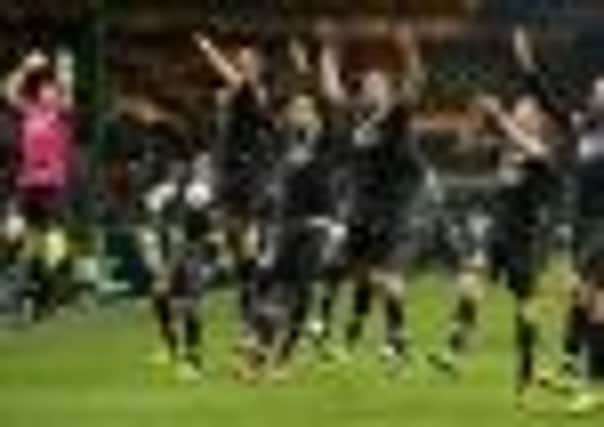Glenn Gibbons: Juve victory should be no surprise


Despite the myriad, wildly varying allegiances, prejudices and perspectives, the consensus appeared to conclude that the Scottish champions deserved nothing more rewarding than second prize, with only a small minority rather puzzlingly convinced that they had been badly treated by the Fates.
There was certainly good cause to bring a charge of abdication of responsibilities against a Spanish referee whose idea of legitimate defensive measures seemed to derive from an admiration of how Stanley Baker and the troops repelled the Zulus at Rorke’s Drift.
Advertisement
Hide AdAdvertisement
Hide AdBut the match official was an irrelevance to the lumbering, sluggish defending and unthreatening finishing of Celtic and the starkly contrasting solidity and imaginative, lightning-quick and deadly penetration of Juventus.
Neil Lennon, too, has been prosecuted in many quarters for a team selection that included the most culpable defender on the night, Efe Ambrose, and the Celtic manager himself admitted afterwards that, given another chance, he might have done things differently.
Ambrose’s slovenliness that led to the opening goal, however, could have had nothing to do with fatigue from his appearance in the final of the Africa Cup of Nations just 48 hours before, as the Italians scored in the third minute. Nor was there anything but incompetence to explain his pathetic header straight at goalkeeper Gianluigi Buffon from only six yards’ range with the score still at 1-0. His desperate miscalculation, leading to the third goal, though, was the act of a man whose brain seemed, by then, to have seized up along with his legs.
But the most absurd consequence of Celtic’s bad experience in midweek has been the savagery of the criticism from so many of the club’s own supporters. This has ranged from observations about the weight difference between the players on each side (Celtic’s apparently carrying excess poundage) to a clamour for the removal of just about everyone involved and the conclusion that the team is basically useless.
This was some overnight transformation from the joy of the day of the match, when the latest half-yearly returns revealed unprecedented economic well-being and the talk was of the outstanding achievement of Lennon and his squad to have qualified from a group in which they had started as fourth seeds.
But reaction is the child of expectation. And it was the deepest mystery of the entire event that anyone who had paid attention to what had gone before could realistically anticipate anything other than victory for the visitors. Too many memories seemed to have been clogged with an image of Celtic’s victory over Barcelona to allow room for the recollection of how Juve had twice played Chelsea off the park and beaten the tough Shakhtar in Donetsk in the course of an unbeaten run to winning their group. There appeared to be no acknowledgement, either, of Celtic’s shaky scoreless draw in the home match against Benfica or the sweaty, unconvincing 2-1 win over Spartak Moscow – courtesy of a late penalty kick by Kris Commons – in the final group match, also in Glasgow.
In addition to all of this, those Parkhead supporters who habitually flock to the bookmakers to do some betting business on these great European nights must have been struck by the discovery that Juventus were odds-on, with their own side on offer at a fraction under 4-1. For a team with their exceptional record on their own turf, this ought surely to have been a sobering introduction to reality.
Defeat by a margin of three goals would certainly have appeared extremely unlikely, even to a hardened punter with a healthy regard for the odds compilers’ judgment. Nor was it really deserved by a Celtic team who did enough to merit a less demoralising defeat. But, whatever team Lennon fielded, the deficit between the home side and their tormentors looked insurmountable.
Insightful Neville shows pundits how it’s done
Advertisement
Hide AdAdvertisement
Hide AdThe low level of punditry among former professional footballers tends to be embarrassingly exposed whenever other sports are represented by such as the peerless Michael Johnson in athletics, John McEnroe in tennis, John Francome in racing and just about any cricketer you care to mention.
A rare opportunity to recognise an admirably informed, insightful and candid voice on televised football should, therefore, be seized, if only to serve as a merciful relief from the interminable tedium of the likes of Garth Crooks, Alan Shearer, Ray Wilkins and Dwight Yorke.
It was a moment of enlightenment during Manchester United’s victory over Everton last weekend, when the co-commentator criticised the incompetent defending of the visitors at the loss of the second, defeat-assuring goal, which gladdened the heart.
During the video replay of Robin van Persie’s strike, the voiceover said, “The defenders push up and leave that space in behind them. It’s Phil Neville there, stepping up on that far side. Why the Everton back four, with all their experience, would want to do that, I don‘t know.”
The pundit/critic was, of course, Phil Neville’s brother, Gary, in a few seconds handing out a lesson in perceptiveness and candour – uncluttered by the worry that he might be offending anyone – to those fellow members of a business that has gained a much warranted reputation for a mealy-mouthed reluctance to upset former workmates.
The resident barrack-room lawyer during his playing days at Old Trafford, Neville’s forthrightness is no surprise to anyone who has ever entered his sphere of influence. These include Sir Alex Ferguson, who knew from Neville’s earliest days that when, inevitably, he was elevated to the captaincy, the armband would be in strong hands.